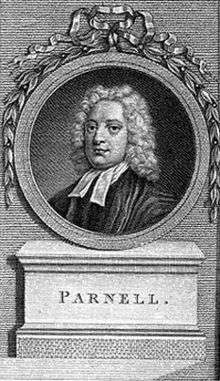Thomas Parnell
Thomas Parnell (b Dublin 11 September 1679 – d Chester 24 October 1718)[1] was an Anglo-Irish poet and clergyman who was a friend of both Alexander Pope and Jonathan Swift.

He was the son of Thomas Parnell of Maryborough, Queen's County (now Port Laoise, County Laois), a prosperous landowner who had been a loyal supporter of Cromwell during the English Civil War and moved to Ireland after the restoration of the monarchy. Thomas was educated at Trinity College, Dublin and collated archdeacon of Clogher in 1705.[2]
He however spent much of his time in London, where he participated with Pope, Swift and others in the Scriblerus Club, contributing to The Spectator and aiding Pope in his translation of The Iliad. He was also one of the so-called "Graveyard poets": his 'A Night-Piece on Death,' widely considered the first "Graveyard School" poem, was published posthumously in Poems on Several Occasions, collected and edited by Alexander Pope and is thought by some scholars to have been published in December 1721 (although dated in 1722 on its title page, the year accepted by The Concise Oxford Chronology of English Literature;[3] see 1721 in poetry, 1722 in poetry). It is said of his poetry, "it was in keeping with his character, easy and pleasing, enunciating the common places with felicity and grace."[4]
He died in Chester in 1718 on his way home to Ireland. His wife and children having died, his Laois estate passed to his brother John, a judge and MP in the Irish House of Commons and the ancestor of Charles Stewart Parnell.[2]
Oliver Goldsmith wrote a biography of Parnell[5] which often accompanied later editions of Parnell's works.
Works
- Essay on the Different Stiles of Poetry (1713)
- Battle of the Frogs and Mice (1717 translation in heroic couplets of a comic epic then attributed to Homer)
An example of his poetry is the opening stanza of his poem The Hermit:[6]
Far in the wild, unknown to public view,
From youth to age a revered hermit grew.
The moss his bed, the cave his humble cell,
His food the fruits, his drink the crystal well.
Remote from man with God he passed his days
Prayer all his business, all his pleasure, praise.
References
- "Clogher clergy and parishes : being an account of the clergy of the Church of Ireland in the Diocese of Clogher, from the earliest period, with historical notices of the several parishes, churches, etc" Leslie, J.B. pp44/5: Enniskille; R. H. Ritchie; 1929
- "Anglo-Irish Families". Irish Midlands Ancestry. Archived from the original on 13 July 2011. Retrieved 10 October 2013.
- Cox, Michael, editor, The Concise Oxford Chronology of English Literature, Oxford University Press, 2004, ISBN 0-19-860634-6
- Gilfillan, George , dissertation in The Poetical Works of Johnson, Parnell, Gray and Smollett 1855, kindle ebook 1855 ASIN B004TQHGGE
- Goldsmith, Oliver The Life of Thomas Parnell ISBN 978-1-171-10588-6
- The full text of this poetic fable is available on Wikisource following an earlier version of the fable in Gesta Romanorum.
- R. Woodman, Thomas Parnell (1985). ISBN 978-0-8057-6883-1
External links


- Thomas Parnell at the Eighteenth-Century Poetry Archive (ECPA)
- Works by Thomas Parnell at Project Gutenberg
- Works by or about Thomas Parnell at Internet Archive